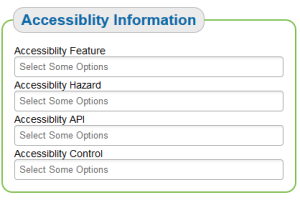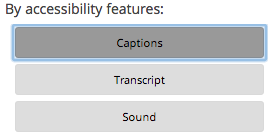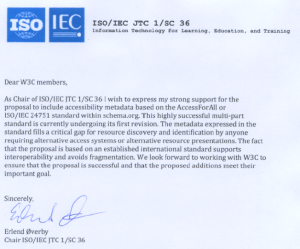At Benetech, one of the Seven Truths we live by is, “partnership over going alone.” Our collaboration with Frank Goossens is a fantastic example of the effectiveness of that principle. Recently, Benetech created a patch for Frank’s very popular “WP YouTube Lyte” plug-in that enables WordPress site administrators to automatically add Schema.org accessibility properties to videos that have closed captions. As Frank announced in his February 3rd blog post, that patch has now been incorporated into the plug-in. “If you have microdata enabled, WP YouTube Lyte now will automatically check if captions are available and if so, adds the accessibilityFeature property with value ‘captions’ to the HTML-embedded microdata.” Translation: users of this plug-in for their WordPress sites can now make their captioned videos more easily discoverable by people who need them.
Compare Results: With and Without Schema.org Accessibility Properties
To see what this looks like in practice, compare the following two search results:
- Run a search for closed-captioned videos on the Predictive Analytics Today website using Google’s closed-captions filter, which does not yet leverage Schema.org accessibility properties. The result: “Your search – site:predictiveanalyticstoday.com – did not match any video results.”
- Next, run the same search using Google Custom Search Engine (CSE), which does allow you to filter results by any Schema.org properties, specifically in this case the accessibilityFeature property. This time, the search result correctly returns a link to the web site that includes the closed-captioned video you were looking for.
Try It Yourself: Captioned Video Search on a11ymetadata.org
If you would like to experiment with other Google CSE searches for closed-captioned videos, check out the Captioned Video Search link on a11ymetadata.org under the “Implementations” menu. Be sure to always have the filter “more:p:videoobject-accessibilityfeature:captions” included in the search box without the quotes.
Encourage Adoption of Schema.org Accessibility Metadata
The good news is, with both an accessibility metadata standard in place, and successful implementations like the WP YouTube Lyte plug-in enhancement, we know how to create a search function for accessible content and we know that it works. The next step: Encourage other content management systems, publishers, and sites like the Internet Archive and Wikimedia to start using Schema.org metadata in their sites so that one day everyone will be able to find the great accessible content that is out there now but can’t yet be found by those who need it.
Pay It Forward: The Rewards of Collaboration
I encourage everyone to engage in collaborations with their favorite content and service providers. Said Frank in his blog post about the project, “This was the first time someone actively submitted code changes to add functionality to a project of mine, actually. Working with Benetech was a breeze and GitHub is a great platform to share, review and comment code. I for one am looking forward to more high-quality contributions like this one!”
We agree with you Frank!


